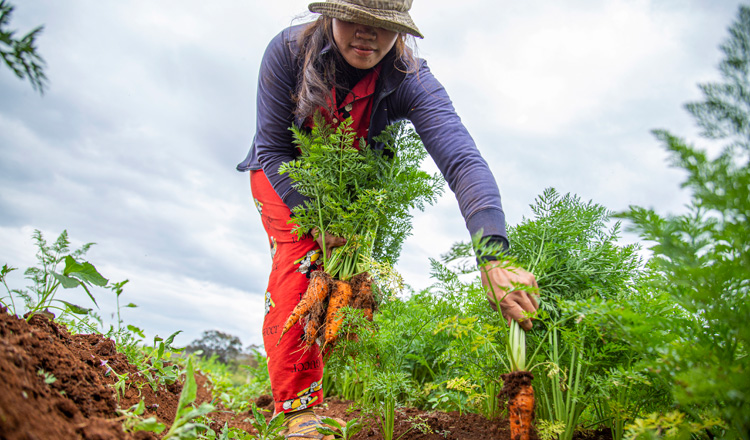Contract Farming in Mondulkiri Fruit and Vegetables Rolling Out
Tropicam Fruit and Vegetable Co Ltd will be rolling out a contract farming agreement with groups of farmers in Mondulkiri province on the supply, purchase and safe production of fruits and vegetables according to Good Agriculture Practice (GAP) standards.
Tropicam Chief Executive Officer Hun Lak said this coming weekend will see representatives of the company, the Ministry of Agriculture, Forestry and Fisheries, chefs’ associations and farmers meet to discuss the advantages of a partnership between producers, buyers and consumers in Mondulkiri province and to set out a contract with the farmers.
He added the company will be working with around 70 clusters of farmers in Mondulkiri and said the programme will encourage farmers to grow produce that meets the highest potential in market demand for produce successfully attaining GAP standards.
Lak said: “We selected Mondulkiri as the kick-off province to roll out the GAP standard for vegetables and fruits in our programme and will mobilise the farm clusters producing GAP standard vegetables so that we can best understand the source of production, the yields, plantation areas and quality control.”
He added: “We want the GAP standard for vegetables and fruits to be recognised and sought out by local consumers,”
Lak said the benefits to farmers entering into contract farming with the company include an increase of income and achieving production efficiencies through crop rotation. Contract farming also delivers price stability to a sustainable market and strengthens farmers’ networks, which contributes to increasing trust with credit institutions. All of the above factors are indicative of contract farming’s ability to enhance the well-being of the nation’s people and its environment.
“While Mondulkiri is the first provincial model to roll out the project, we have piloted previously in Kandal and Kampong Chhnang.” Lak explained that farmers who join the Tropicam project are asked to grow vegetables by scheduled planting and harvests. Tropicam then buys all the yield and packages it for distribution to the market.
Lak added, “We offer a better price than prevailing market prices once farmers implement the GAP standard.
Song Kheang, director of Mondulkiri’s Provincial Department of Agriculture, Forestry and Fisheries, said more and more farmers are engaged in vegetable plantations and are expanding their production area compared with previous years.
He added that around 38 families in the city of Sen Mononom are now growing vegetables, with most growing cabbage, Chinese cabbage, carrots and some potatoes. Vegetables in Mondulkiri are primarily exported to the capital and supermarkets. He added their production is still quite small at 500 kilogrammes per day.
Last October, the Ministry of Agriculture, Forestry and Fisheries, together with Tropicam and local hotel, restaurant, tourism and chef associations inked an agreement to boost the safe production of vegetables and fruits and develop a centre for food safety.
In 2019, Cambodia had 57,262 hectares of vegetable production under cultivation which produced about 682,012 tonnes of food. However domestic demand of 1 million tonnes of vegetables yearly exceeds that production level, according to the Ministry of Agriculture.
This deficit in domestic supply forces Cambodia to import an average of 500 to 1,000 tonnes daily. Given that imported vegetables are generally undocumented with no clear source of origin or proper safety checks, some could be harmful to people’s health, said Ngin Chhay, general director of the General Directorate of Agriculture (GDA).
Chhay said the GDA is now seeking and attracting investment from the private sector to develop a value chain of safe fruits and vegetables under a public, private and producer agreement via contract farming. He said: “A partnership with the private sector can boost fruit and vegetable production, promote good agricultural practice standards in meeting local demand for safe, quality and competitive produce and strengthen category exports.”







